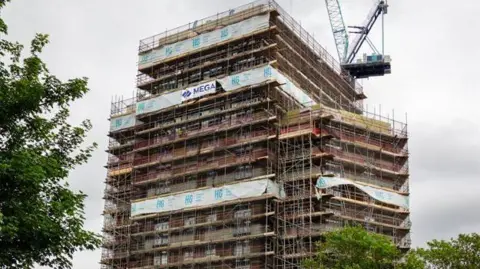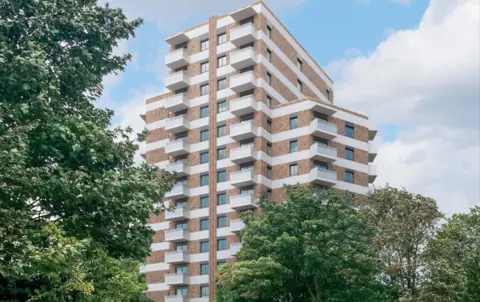Women-only tower block to open next summer
 Ealing Council
Ealing CouncilA new housing block in west London currently under construction will be a "UK first" in providing homes exclusively for women.
Brook House in Acton will provide a "lifeline" to women and survivors of domestic abuse struggling to find a home.
When completed, it will provide 102 "genuinely affordable" social rented flats, replacing an old 39-home estate with the cost of renting a home on average less than a quarter of an equivalently sized home in the private sector.
Ealing Council currently has more than 600 single women on its waiting list and over 8,000 households in the borough waiting for a home.
 Ealing Council
Ealing CouncilThe tenants will be a mixture of women from the council waiting list and residents put forward by Women's Pioneer Housing, which will manage the site.
Women's Pioneer Housing was founded in 1920 by suffragists. It manages around 1,000 properties in west London, most of which are studio or one-bedroom flats in large converted Victorian or Edwardian buildings.
The housing association said its mission is to offer single women access to "safe, secure, and affordable homes and services".
It also aims to influence other housing providers so they "understand the needs of single women".
The original estate at Brook House, in Gunnersbury Lane, opposite Acton Town station, was built more than 90 years ago, with additional homes and blocks added in the 1970s.
Ealing Council said many of these homes were no longer fit for modern living standards and were not fit for refurbishment.
Construction, which is being carried out by L&Q, is expected to be completed by next summer, with the first residents moving in shortly after.
Council leader Peter Mason said the homes would be for women "disproportionately affected by crisis" with some let to women who have experienced domestic abuse and other dangers.
"There is a big need for this type of specialist, women-only accommodation. Almost 3,500 cases of domestic abuse were recorded in Ealing in the last 12 months.
"London's affordable housing crisis disproportionately impacts women, who still face a gender pay gap that sees them on average earn less than men, constraining their ability to afford rent."
Listen to the best of BBC Radio London on Sounds and follow BBC London on Facebook, X and Instagram. Send your story ideas to [email protected]
